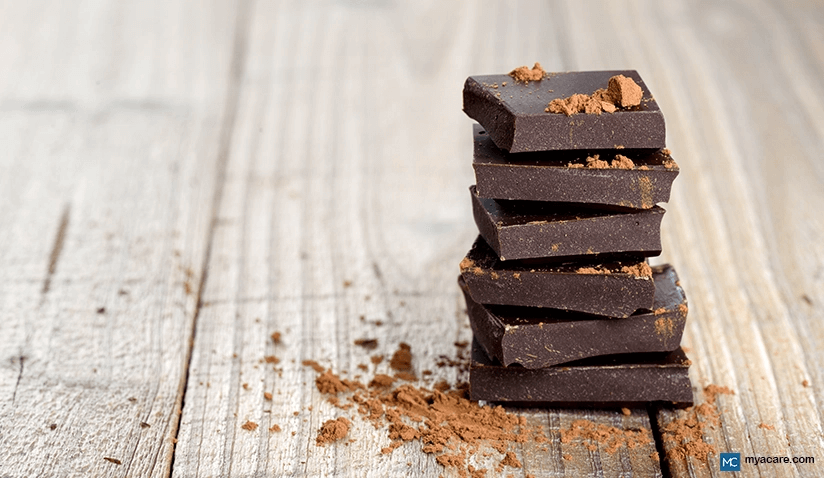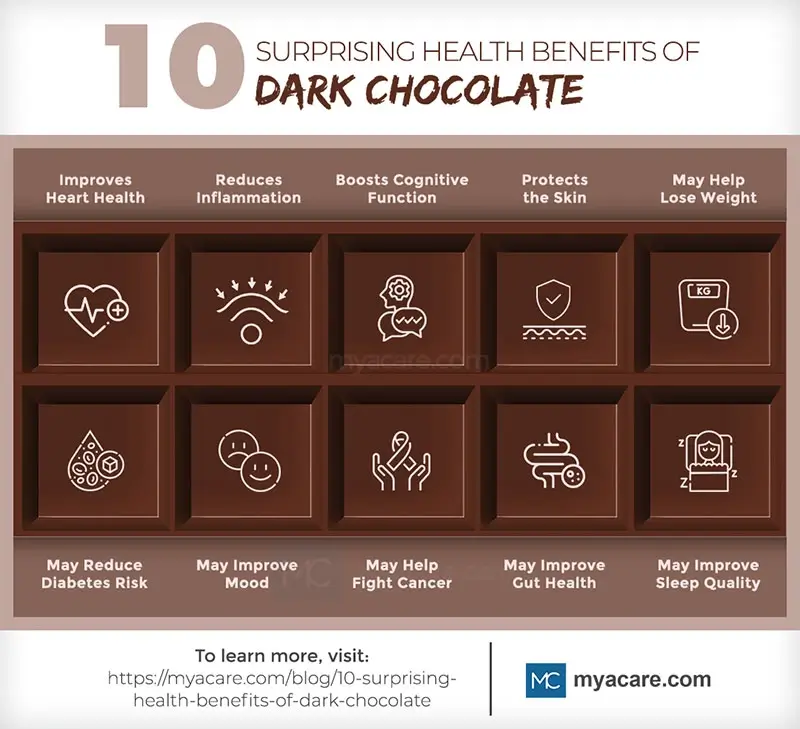10 Surprising Health Benefits of Dark Chocolate

Medically Reviewed by Dr. Rosmy Barrios - August 19, 2024
Updated by Dr. Sony Sherpa, (MBBS) - August 22, 2025
Fact Checked by Dr. Rae Osborn, Ph.D - November 20, 2025
Dark Chocolate vs. Milk Chocolate
Dark Chocolate Benefits: Improves Heart Health -
Dark chocolate is one of the most delicious and indulgent treats you can enjoy without feeling guilty. Not only does it taste amazing, but it also has many health benefits that you may not be aware of.
It is made from the seeds of the cacao tree, which are rich in antioxidants such as flavonoids, polyphenols, epicatechin, catechin, and procyanidins, and other beneficial compounds that work together to protect the body from oxidative stress and disease.
Nutritional Profile of Dark Chocolate
Here’s a quick look at the nutrients found in dark chocolate (50g serving, 70–85% cocoa):
- Fiber: 5.5g
- Iron: 33%
- Magnesium: 27%
- Copper: 98%
- Manganese: 42%
Note: The percentages are based on recommended daily values.
Dark chocolate also contains potassium, phosphorus, zinc, and selenium.
Dark Chocolate vs. Milk Chocolate
When it comes to health benefits, not all chocolate is created equal.
- Dark chocolate packs more cocoa, which means more antioxidants, fiber, and minerals. It is naturally non-dairy and typically contains less sugar, making it a healthier choice.
- Milk chocolate, on the other hand, tends to be higher in sugar and includes added dairy, which dilutes the concentration of cocoa and beneficial compounds like flavonoids.
This is why studies highlight dark chocolate as the variety linked to most health benefits, while milk chocolate is more of a sweet treat than a functional food.
In this blog, we will explore 10 surprising health benefits of dark chocolate that will make you love it even more.
Dark Chocolate Benefits
1. Improves Heart Health
One of the most impressive benefits of dark chocolate is that it can improve heart health. Dark chocolate improves heart health in a number of ways. It can lower blood pressure, cholesterol, and inflammation, which are all risk factors for heart disease. It can also improve blood flow to the heart and prevent blood clots from forming. This is achieved by its ability to increase the production of nitric oxide, a gas that relaxes and widens the blood vessels.
A study found that eating dark chocolate at least five times a week was associated with a 57% lower risk of coronary heart disease. Another study found that eating dark chocolate two or more times per week reduced the risk of having a stroke by 20%.
Researchers have found that dark chocolate supports heart health in multiple ways:
- Blood pressure: Flavanols help relax blood vessels, which improves circulation and lowers high blood pressure risk.
- Cholesterol: Dark chocolate may lower oxidized LDL, which is the harmful cholesterol, while improving HDL levels, also known as the “good” cholesterol.
- Endothelial function: It helps the endothelium — the delicate lining of blood vessels — work more effectively, which supports healthy blood flow.
2. Reduces Inflammation
Inflammation is a natural response of the body to fight infections and injuries, but chronic inflammation can lead to various diseases such as diabetes, arthritis, and cancer. Dark chocolate can help reduce inflammation by modulating the immune system and suppressing the production of pro-inflammatory cytokines. It also contains polyphenols such as flavanols, which are anti-inflammatory agents that can protect the cells from oxidative stress and damage.
A study found that eating 40 grams of dark chocolate per day for four weeks reduced the levels of C-reactive protein, a marker of inflammation, by 23%.
3. Boosts Cognitive Function
Dark chocolate is good for your heart and your brain. It can boost cognitive function by improving blood flow to the brain, enhancing neurogenesis (neuronal growth), and stimulating the release of neurotransmitters such as dopamine and serotonin. Dark chocolate can also protect the brain from aging and neurodegenerative diseases by reducing oxidative stress and inflammation.
A study found that eating dark chocolate every day for eight weeks improved memory, attention, processing speed, and verbal fluency in elderly people with mild cognitive impairment. Other research reveals that eating dark chocolate before a cognitive test improved performance and reduced mental fatigue.
Recent findings suggest that dark chocolate may even influence brainwave patterns. Consuming it has been linked to increased gamma frequency activity in the brain, which is associated with improved memory and learning ability. However, more research is required to establish conclusive findings.
4. Protects the Skin
Dark chocolate can also benefit your skin by safeguarding it from sun damage, improving hydration, and reducing acne. The flavonoids it contains can absorb UV rays and prevent them from reaching skin cells. Flavonoids can also increase blood flow to the skin, which improves its appearance and elasticity. Dark chocolate also contains zinc, an essential mineral for skin health. Zinc can regulate sebum production, fight bacteria, and reduce inflammation, which can help prevent acne breakouts.
A study found that eating 20 grams of dark chocolate (320mg of cocoa flavanols) per day for 12 weeks increased skin hydration, smoothness, and thickness.
5. May Help With Weight Loss
Dark chocolate may seem like an unlikely ally in your weight loss journey, but it can actually help you shed some pounds by suppressing your appetite, increasing your metabolism, and reducing your stress levels. Amazingly, dark chocolate contains fiber, which can make you feel full and satisfied for longer periods of time. The caffeine and theobromine in dark chocolate are stimulants that can boost your energy expenditure and help to burn fat. Dark chocolate can also lower cortisol levels, which is a stress hormone that can trigger hunger and fat storage.
6. Reduces the Risk of Diabetes
Dark chocolate may seem like a forbidden food for people with diabetes, but it can actually help prevent or manage this condition by improving insulin sensitivity, lowering blood sugar levels, and reducing inflammation. The nutrients in dark chocolate, specifically its polyphenols, can enhance the function of insulin receptors and facilitate glucose uptake by cells. Dark chocolate also contains magnesium, a mineral that can regulate blood sugar levels and prevent insulin resistance.
It may also protect the pancreas from inflammatory damage, which can help to prevent diabetes. A study found that eating dark chocolate every day for 15 days improved insulin sensitivity by 30% in healthy volunteers.
7. May Improve Mood
Dark chocolate might make you happier by stimulating the production of endorphins, serotonin, and anandamide, which are neurotransmitters that are responsible for feelings of pleasure, happiness, and well-being. Those who frequently consume dark chocolate tend to experience lower levels of cortisol and adrenaline, which are known to promote anxiety and depression. Dark chocolate can also provide sensory satisfaction that improves mood and reduces cravings for other sweets.
It was found that eating 40 grams of dark chocolate per day for two weeks reduced the levels of cortisol and anxiety in people with chronic stress.
8. May Help Fight Cancer
Dark chocolate may also have anti-cancer properties that support by inhibiting the growth, invasion, and metastasis of cancer cells, inducing tumor apoptosis (cell death), and preventing angiogenesis (cancer blood vessel formation). Antioxidants in dark chocolate naturally scavenge free radicals and protect the DNA from cancerous mutations and damage. They also improve immune function and help the body to better detect cancer.
9. May Improve Gut Health
Eating dark chocolate benefits your gut by improving the diversity of its microbiome. Dark chocolate contains prebiotics, which are indigestible fibers that can feed the beneficial bacteria and increase their numbers and the health effects they impart. Polyphenols in dark chocolate influence the activity and metabolism of good gut bacteria, which enhances their interactions with the host. These also reduce the growth of harmful bacteria such as Clostridium difficile, which can cause diarrhea and colitis.
A study found that eating dark chocolate every day for four weeks increased the levels of Bifidobacterium and Lactobacillus, which are probiotic bacteria that can improve digestion, immunity, and mood.
10. May Help Improve Sleep Quality
Dark chocolate can also help you sleep better by helping to regulate your circadian rhythm, which is the internal clock that tells you when to sleep and wake up. The tryptophan in dark chocolate is a well-known precursor to serotonin and then melatonin, which is the hormone that induces sleepiness and promotes deep, restful sleep. The high magnesium levels in dark chocolate can relax the muscles and nerves, thereby easing symptoms of insomnia. Eating dark chocolate at any time of the day appears to improve sleep quality and overall circadian rhythm, according to various studies.

How Much Dark Chocolate Should I Eat per Day?
To enjoy the above benefits, you should opt for dark chocolate that contains a minimum of 70% cocoa solids, is organic, fair trade, and minimally processed for maximum nutrition. The higher the cocoa content per serving, the better the health benefits.
It is a good idea to limit your intake to no more than 30-50g per day, as too much dark chocolate can cause side effects such as headaches, nausea, or weight gain. Studies suggest that for optimal heart health benefits, 30g portions ought to be consumed 3-5 times a week. 6 or more portions did not pose any extra benefits for the heart, although consuming up to 40g per day may help with enhanced cognition and a better mood.
Risks and Considerations
Risks
While dark chocolate can be beneficial, it is important to be aware of potential downsides:
- Heavy metals: Some dark chocolate brands may contain trace amounts of cadmium and lead. Choosing trusted brands reduces this risk.
- Stimulants: Dark chocolate contains caffeine and theobromine, which can cause jitters, rapid heartbeat, or insomnia in sensitive individuals.
- Calories and sugar: Even with less sugar than milk chocolate, dark chocolate is calorie-dense and can contribute to weight gain if overconsumed.
- Health conditions: People with acid reflux, kidney stones (due to oxalates), or sleep issues may need to limit intake.
Considerations
To get the most from dark chocolate:
- Look for varieties with at least 70% cocoa.
- Choose products with minimal sugar and clean ingredient lists.
- Opt for certified, ethically sourced brands when possible.
- Incorporate it into the diet smartly and limit how much you eat. Enjoy a square as a snack, grate it over yogurt, or melt it into oatmeal instead of reaching for sugary desserts.
Conclusion
Dark chocolate is more than just an enjoyable treat. It is a superfood that can provide many health benefits for your heart, brain, skin, blood sugar, mood, immune system, gut, and circadian clock. However, not all dark chocolates are created equal. Remember to eat dark chocolate in moderation and as part of a balanced diet and lifestyle.
FAQ
Does dark chocolate have caffeine?
Yes, dark chocolate contains caffeine, usually around 20–25mg per ounce.
How much caffeine does it have compared to coffee?
A cup of coffee has about 95mg, so dark chocolate provides much less caffeine but can still have a mild stimulating effect.
Is 90% dark chocolate better than 70%?
Higher cocoa percentages usually mean more antioxidants and less sugar. However, 90% is more bitter since the cocoa amount is linked to the bitterness level, so 70–85% may be a better balance for most people.
To search for the best doctors and healthcare providers worldwide, please use the Mya Care search engine.
The Mya Care Editorial Team comprises medical doctors and qualified professionals with a background in healthcare, dedicated to delivering trustworthy, evidence-based health content.
Our team draws on authoritative sources, including systematic reviews published in top-tier medical journals, the latest academic and professional books by renowned experts, and official guidelines from authoritative global health organizations. This rigorous process ensures every article reflects current medical standards and is regularly updated to include the latest healthcare insights.

Dr. Rosmy Barrios is an aesthetic medicine specialist with international work experience. She earned her physician diploma at the Universidad Del Norte’s School of Medicine in Barranquilla, Colombia, and her specialty at John F. Kennedy University in Buenos Aires, Argentina. Dr. Barrios is a member of the Pan-American Aesthetic Medicine Association (PASAM) and the Union Internationale de Médecine Esthétique (UIME). She is an expert health writer with keen interests in aesthetic medicine, regenerative aesthetics, anti-aging, fitness, and nutrition. Currently, Dr. Barrios heads the Regenerative Aesthetics department at a renowned Internal Medicine clinic based in Belgrade, Serbia.

Dr. Sony Sherpa completed her MBBS at Guangzhou Medical University, China. She is a resident doctor, researcher, and medical writer who believes in the importance of accessible, quality healthcare for everyone. Her work in the healthcare field is focused on improving the well-being of individuals and communities, ensuring they receive the necessary care and support for a healthy and fulfilling life.

Dr. Rae Osborn has a Ph.D. in Biology from the University of Texas at Arlington. She was a tenured Associate Professor of Biology at Northwestern State University, where she taught many courses to Pre-nursing and Pre-medical students. She has written extensively on medical conditions and healthy lifestyle topics, including nutrition. She is from South Africa but lived and taught in the United States for 18 years.
References:
Featured Blogs



